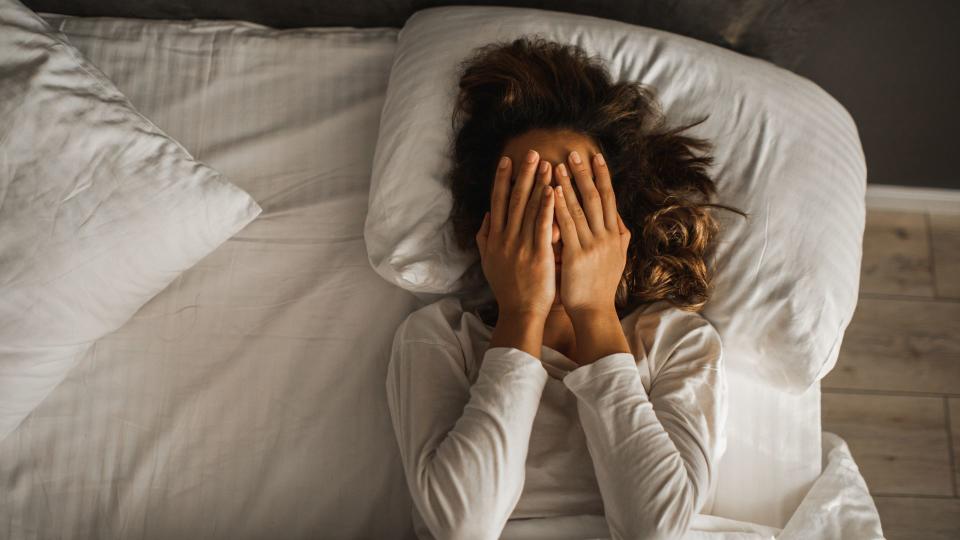Can menopause cause a loss of taste and smell? Plus, 6 other signs of menopause you might not expect

Can menopause cause a loss of taste and smell? If you've experienced this symptom and are wondering what it's all about, you're not alone. While we often associate changes in how we smell and taste with colds, flu, and Covid-19 in recent years, there's more to this than you might think.
Fortunately, the conversation around both perimenopause and menopause has grown in recent years with a push by charities to break taboos around topics like hot flushes and mental health, and celebrities like Davina McCall and Shania Twain opening up about their personal realities of this life stage. Yet, there are still a fair few informational gaps on the lesser-known symptoms, the ones you could easily mistake for something else.
Here, woman&home speaks to a selection of doctors, nutritionists, and sleep specialists to reveal the more uncommon symptoms of perimenopause and menopause and why they appear during this time in life.
Can menopause cause a loss of taste and smell?
Yes, it turns out that menopause can cause a loss of taste and smell, confirms Emma Bardwell, a registered nutritionist and women's health specialist. "For starters, oestrogen is linked with saliva production, so when hormone levels drop, women can find their mouths become drier, and because saliva is important for stimulating taste buds, having a dry mouth can affect the taste of foods,” she says.
In fact, according to consumer-collected data from PinkLady, with which Bardwell works, more than one in three women experience sensory changes like this. 46% reported a change in smell and 42% reported a change in taste. However, a concerning 91% of women were completely unaware that this was common during the stages of menopause.

Unexpected signs of menopause
However, it's not just changes to taste and smell that many women get surprised by in menopause. There are a lot more that may not be as common - but can be just as problematic as hot flushes, sleep problems, and feelings of intense anxiety brought on by menopause.
1. Vivid dreams and nightmares
Thanks to the change in hormones during this time, menopause affects our sleep cycles. Insomnia and being unable to fall asleep fast as well-known symptoms - but many menopausal women also report changes in their dreams.
Sammy Margo, a physiotherapist specialising in sleep, explains that decreased oestrogen and progesterone can lead to an increase in REM sleep. "During this sleep cycle, you’ll be closer to waking, causing you to experience your dreams more vividly. This can entail dreaming in very specific colours and all the images you see can appear very bright."
Margo, who works with Dreams, says, "There will also be a heightened level of detail compared to other dreams. Your dream could almost feel life-like, and you may experience a wide range of sensations, such as touch, taste, smell, and sound."
Not only can these dreams be more vivid visually and turn into lucid dreams in some cases, but they can also start becoming uncomfortable too. We spoke to Maria, 44, who lives in Edinburgh and is currently dealing with vivid dreaming in perimenopause. She says, "For the 5 days up to my period, I dream very explicit imaginings. They can range from very detailed and often grisly murder scenes to pornographic, I have no idea why.”

2. Menopause mouth
As most of us will know, menopause can quickly take over some of the body's everyday functions and where we previously might never have had an issue, one arises. A not-so-spoken-about symptom is the so-called 'menopause mouth', an uncomfortable change that can happen in the mouth when a lack of moisture is produced.
According to GP and women's health specialist, Dr Sarah Jenkins, this strange sensation is actually quite common. She says, "Many women (including me) have burning tongue syndrome as a symptom of menopause. We all worry we are deficient in Vitamin B12, or folate, or worry our tongue suddenly got bigger and sore." However, it can be down to the decrease in oestrogen, a crucial hormone for our mouths and saliva glands, as noted.
If you're struggling with 'menopause mouth', Dr Jenkins suggests first going to the doctor for a deficiency check. However, should your dry mouth be a menopausal side effect then she says it's best to just drink plenty of water and fluids.
3. Thrush
When it comes to our skin in later life, there are a lot of factors that can begin to affect it and one of these is menopause. You may have found that menopause has been affecting your self-tan or perhaps you're looking at how to treat menopausal acne. It's not just the skin on our face that's affected though, notes Dr Jenkins.
“Thrush, recurrent urinary infection and lichen planus/sclerosis are sadly common symptoms which are underreported," Dr Jenkins, who is also a skin expert at Skin Excellence Clinics, notes. "As the skin changes due to the oestrogen levels falling in our bloodstream, we don't produce as much collagen and elastin to maintain healthy, plump, elastic skin. This affects our whole body as skin is the number one organ."
When entering menopause, the vaginal canal can shorten. The skin can get thinner and lose its natural lubrication with a sudden lack of natural discharge. All these changes can quickly lead to problems like thrush and other vaginal issues. Whilst this can be worrying, and you should always consult your doctor if you're concerned, it's a completely normal symptom of menopause.
4. Cold flushes
We know about hot flushes during menopause but cold flushes can be just as problematic.
Adele Johnston, a certified nutritionist and menopause coach, discusses how she often struggles with this symptom herself. She explains, "One of the more uncommon symptoms of menopause but one I myself have suffered with and still have days I suffer with is cold sweats. Cold flushes are as they sound. Rather than a hot flush whereby you’d feel the heat from inside your body resulting in sweating, cold flashes cause your bones to feel so cold you can’t get heat."
To try to combat this recurring coldness, Johnston recommends keeping layers on your person at all times, even on a hot day. "I tend to have hot water bottles, blankets and even thermal socks for times it gets too much," she says.

5. Brittle nails
Much like skin, the health of your nails can start deteriorating from the very beginning of perimenopause. Where you may have had strong nail beds that grew quickly and kept their strength, you may now be seeing that they break more easily and look a little duller.
"During the perimenopause and menopause, nails can become thin or soft, meaning they can split, crack or break more easily," explains Dr Louise Newson, a GP and menopause specialist. "Your nails are made of a protein called keratin, which gives them structure and helps keep them hard and strong. Oestrogen helps to produce keratin, so when levels are lower, your nails may be more susceptible to breaking.”
Maria has also struggled with this. "I find the only way I can keep my nails from breaking is to have them shellac-ed on a permanent basis. I have done this for the past 2 years and though I worry about the state of my natural nails, before that my nails were always splitting, breaking and really, really fragile.”
6. Dizziness
This may be perhaps one of the more common symptoms within this list, with a larger number of women saying they experience this regularly.
According to Dr Rebeccah Tomlinson, a GP and menopause specialist at Health & Her, around 25% of women describe dizziness as one of their symptoms of perimenopause. "It is not entirely known why this happens but it is thought that oestrogen plays a role within the inner ear and balance symptoms so fluctuation of this hormone can cause balance fluctuations too," she explains.
However, it's always worth checking in with a doctor if you have regular spells of dizziness, especially if they come out of the blue. There are other conditions that could be causing the symptoms, including those linked to low blood pressure, dehydration, and stress.

